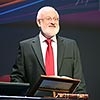

 It isn’t easy to answer a question of where is the point from which a person can determine whether he’s going to receive pleasure from egoism or from bestowal? Does a person want to be a slave to Pharaoh or to the Creator?
It isn’t easy to answer a question of where is the point from which a person can determine whether he’s going to receive pleasure from egoism or from bestowal? Does a person want to be a slave to Pharaoh or to the Creator?
Our main task is to reach a point where we ask to change our ruler so that the force of bestowal would rule over us instead of reception. We study Kabbalah and carry out all the recommendations of Kabbalists in order to be able to make this choice.
We can come to this choice either by the path of suffering, through the natural progression of time (Beito), or by the path of Light (Achishena). On the path of natural development, only blows await us. This is when the Creator takes away all possible pleasures from Pharaoh, our egoism, or the desire to receive for oneself, and therefore we experience suffering. That’s why we are ready to exit from Pharaoh’s rule and to distance ourselves from him. After all, nature itself is forcing us to avoid that which causes us to suffer.
And then there’s the path of Light, “hastening of time” (Achishena). This is when our egoistic desire is still allowing us to receive pleasure, but we carry out various actions in order to build a new attitude toward the desire to bestow. And even though I receive egoistic pleasure and I’m under Pharaoh’s rule, I don’t feel that this is something negative: I’m enjoying life. However, I begin to look for a way to rise above him and to no longer depend on him, to start to value the quality of bestowal.
This means that I try to walk the path of Light so that the quality of bestowal would effect me and give me the understanding that Pharaoh is an evil ruler. His evil isn’t in the pleasures that he gives but in my receiving these pleasures for my own sake. This entirely new criterion is based not on pleasures, but on their direction, on who receives: I or the others (or the Creator along with others).
And then instead of judging the path through sensations, according to pleasure or suffering, I switch to a logical calculation of what’s good and evil, of true versus false. I come to realize that truth is bestowal, the upper force, the Creator, and I want this truth! And even if I feel good under Pharaoh’s rule, I still want to adhere to bestowal.
If a person comes to such a realization, he rises above the natural or the animal evaluation (Beito) and makes decisions on the level of “Achishena,” thereby pushing himself toward exiting from Pharaoh’s rule. And then he doesn’t need to go through physical suffering and receive blows to the desire to receive through various crises we feel in the world today and which will only increase in the future if we continue to progress by the natural flow of events (Beito).
His suffering becomes the suffering on the path of “Achishena,” the suffering of love. After all, he’s aspiring toward bestowal, something opposite to love of self. He asks the Creator, or the upper Light, to change his pleasure from egoistic to from bestowal. This is how a person advances.
[40773]
From the 1st part of the Daily Kabbalah Lesson 4/15/2011, Writings of Rabash
Related Material:
Entering A New Land
A Great Egoism That Leads To Bestowal
Egyptian Slavery Means You Have No Right To Bestow
 Attempts to be in faith above reason constitute preparation for the Machsom. We must desire this state, even though we are not yet ready to achieve it. Sometimes we are given a chance to feel “faith above reason,” but as we approach the Machsom (the barrier separating us from spirituality) we now want to remain in faith above reason, to have at least some contact with it, and not fall into only one point: hatred (ego) or love (bestowal).
Attempts to be in faith above reason constitute preparation for the Machsom. We must desire this state, even though we are not yet ready to achieve it. Sometimes we are given a chance to feel “faith above reason,” but as we approach the Machsom (the barrier separating us from spirituality) we now want to remain in faith above reason, to have at least some contact with it, and not fall into only one point: hatred (ego) or love (bestowal).
We must live with this fear at all times. Indeed, if I regard reality from only one viewpoint, I am nothing but a beast. If I want to be a human, “sitting atop my donkey” (my egoistic desire), I must include these two opposite points within myself.
The first point is my criticism and disagreement with others. And the second point is my “I” which disagrees with my criticism of others. (To be clear, we’re not talking about dissemination work, but inner work within the group toward unity, when I criticize a “friend,” his qualities which are unrelated to the work.) And although I understand that my criticism is true, I still wish to reveal the Creator between us. It is He who plays the role of Pharaoh, turning my love into hatred, unity and connection into resistance, criticism, and discord.
He plays this role so that I would want to connect with the friend above Pharaoh, in spite of my heart rejecting and hating him, and being unwilling to unite with him. I have heaps of complaints against him, but with all of this we’re still building a relationship of love, harmony, and total unity. Within my friend, I wish to see the Creator.
I don’t run away into the exalted point where everything is fine; rather, I maintain these two opposite points within me at all times and keep advancing in between them. At that point I already have the beginning of a spiritual vessel, Malchut and Keter, two opposite points. And I am in the middle, maintaining the condition of restriction between them.
And then the distance between them continues to grow, until it forms a certain spiritual object. All this work is carried out practically in the group, and only in relation to the friends.
[40629]
From the 1st part of the Daily Kabbalah Lesson 4/13/2011, Shamati No. 59
 Question: Do we, your non-Jewish students of Kabbalah, have to celebrate Passover and other holidays? Many of us are saying that we should hurry up to buy Matza and do the Passover Seder.
Question: Do we, your non-Jewish students of Kabbalah, have to celebrate Passover and other holidays? Many of us are saying that we should hurry up to buy Matza and do the Passover Seder.
Answer: My dear students, I will try to explain it one more time, simply and once and for all, since I answered this question many times already.
You must study all Jewish original sources because they are written by Kabbalists. We study them in their authentic Kabbalistic interpretation, and not as the Jewish people have been studying them starting from 1st century CE, in the earthly manner, as if these books talk about our world.
It obviously includes the study of “Haggadah shel Pesach” (Passover Haggadah) about the exodus from Egypt because it does not talk about the exit from the land of Egypt, but of our ascent above egoism. You can observe the tradition together with us, you can sit by a festive table, you can virtually, together with us, eat Matza and fish patties or bread with pork, whatever you like.
Baal HaSulam writes in The Writings of the Last Generation that even at the final correction, each nation, if it wishes so, will preserve its religion and customs. Only relationships between people change from hatred to love, which is the exodus from Egypt. I wish all of you such a holiday!
[40844]